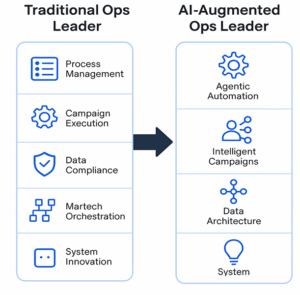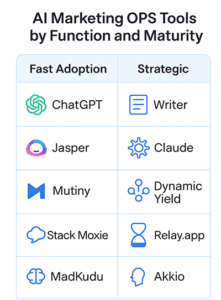The AI-Augmented Ops Leader: Redefining the Role of Marketing Operations in 2025
Marketing Operations (MOPs) has long been the unseen engine behind top-performing marketing teams, designing workflows, managing campaign infrastructure, ensuring data compliance, and orchestrating marketing technology (martech) systems. But in 2025, this role is experiencing a major shift. The AI revolution isn’t replacing Marketing Ops leaders, it’s enhancing them, broadening their strategic influence, and redefining what excellence means in a data-driven, AI-enabled world.
From Tactical Steward to AI Architect
As B2B marketing becomes more complex, the need for operational efficiency, data clarity, and strategic flexibility has never been greater. AI is not a magic solution, but a catalyst that transforms what’s achievable. Modern operations leaders are becoming AI Ops Architects, guiding not just execution but also innovation.
In its “State of Martech & Marketing Operations Report 2025“, Intent HQ outlines this transformation clearly:
We are entering the era of agentic automation, in which AI agents operate independently to perform tasks across systems, decreasing operational overhead and speeding up campaign cycles.

Tools of the Trade: From Accessible AI to Advanced Automation
A new wave of tools is transforming how Marketing Operations leaders work on a daily basis. AI is not just helping automate tasks; it’s defining workflows, revealing insights, and enabling teams to operate accurately and at scale.
Foundational Tools for Fast Adoption
Platforms such as ChatGPT, Jasper, and Mutiny are popular due to their user-friendliness and fast results. These platforms help automate repetitive tasks, such as segmentation, email personalization, and A/B testing, while empowering marketers to move faster, test smarter, and scale more efficiently.
-
ChatGPT expedites the processes of planning, reporting, and ideation within content and campaign operations.
-
Jasper enables on-brand content creation with built-in style guides.
-
Mutiny provides firmographic-based web personalization without dependency on engineering resources.
Next-Level Platforms for Strategic Ops Leaders
Progressive marketing ops teams are exploring more specialized or enterprise-ready AI tools:
-
Writer (AI writing with brand governance, enterprise-grade compliance)
-
Claude (long-context reasoning and summarization for operational documentation and planning)
-
Dynamic Yield (personalization engine with predictive segmentation and omnichannel orchestration)
-
Stack Moxie (automated QA for martech stacks, form testing, and compliance monitoring)
-
Relay.app (AI workflow automation across systems, think Zapier, but with AI decision logic)
-
MadKudu (predictive lead scoring for revenue ops)
-
Akkio (drag-and-drop machine learning for marketers and analysts)
“We are entering the era of agentic automation where AI agents perform interconnected tasks autonomously across systems,” notes Intent HQ (2025). “This frees ops teams to focus on high-value initiatives rather than operational overhead.”
All tools remain actively maintained and relevant in 2025, with varying adoption levels based on organizational maturity and needs. For enterprise-grade operations and governance, Writer and Dynamic Yield stand out. Claude and Relay.app are gaining traction for AI-powered workflows. MadKudu and Akkio provide strong entry points for predictive modeling without technical barriers. Meanwhile, Stack Moxie serves as a specialized backbone for operational integrity.

Hybrid Skillsets Powering the Future
In Gartner’s AI in Marketing Report, they predict that by 2026, more than 60% of Marketing Ops roles will require hybrid skills, combining AI prompt engineering, data analytics, and strategic planning. It’s not just about learning to use AI tools; it’s about understanding how to integrate them, stay compliant, and be responsible across complex martech systems.
What Comes Next: Skills, Not Just Systems
To stay competitive, MOPs professionals in 2025 and beyond must cultivate:
-
Prompt engineering literacy: Knowing how to structure prompts for better AI outputs
-
Strategic thinking: Turning AI insights into campaign decisions
-
Cross-functional leadership: Collaborating with legal, IT, and analytics teams
-
AI governance fluency: Understanding the risks and regulations of automated decisions
The AI-augmented MOPs leader isn’t replacing creativity or strategy; they’re unlocking more of it by freeing humans from the drudgery of marketing execution.
Final Thought: It’s Not Just Ops—It’s Leadership
In 2025, MOPs will no longer be just back-office support. Instead, they are becoming a central hub for marketing transformation. To succeed, operations professionals must embrace continuous learning, develop AI fluency, and position themselves as trusted strategic partners. Those who do will not only achieve operational excellence, but they will shape the future of marketing itself.
